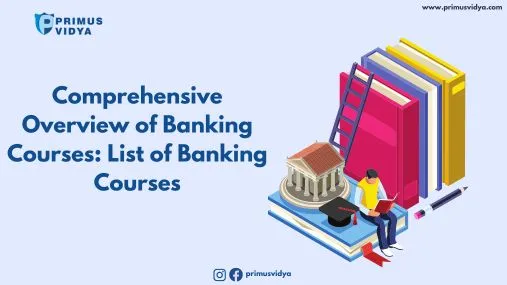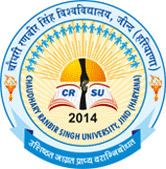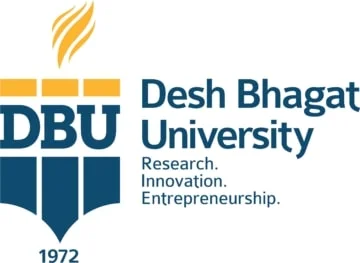
By
Primusvidya
Date
05/03/2024
Comprehensive Overview of Banking Courses List of Banking Courses
The banking and financial services sector presents tremendous opportunities for ambitious professionals in India. Considered an essential industry that touches all parts of the economy, banking is set to grow rapidly fueled by increasing consumer demand, digital payments adoption, lending, and financial inclusion goals.
The banking and financial services sector presents tremendous opportunities for ambitious professionals in India. Considered an essential industry that touches all parts of the economy, banking is set to grow rapidly fueled by increasing consumer demand, digital payments adoption, lending, and financial inclusion goals. To support this growth, thousands of qualified banking professionals will be needed in the coming decade across public sector banks, private banks, NBFCs, fintech companies, and more.
For those who enjoy numbers, managing money matters, understanding wider business and economic contexts, and serving diverse customers, the banking sector offers challenging work along with job stability and good compensation. Students from varied educational backgrounds including commerce, economics, finance, management, and even humanities can obtain the necessary skills and knowledge through a wide range of specialized banking courses now accessible. Ranging from short certification programs up to two-year master's degrees, these well-structured courses efficiently equip graduates to commence their journey in dynamic financial services roles.
This article will explore the most prominent banking and related financial services courses such as undergraduate and postgraduate courses in Finance, FinTech, and Accounting in Finance, available today at undergraduate and postgraduate levels. The curriculum, admission processes, scope of careers, and growth trajectories associated with each option are analyzed in depth to support readers find the best educational path aligned to their interests within this vitally important industry.
Reasons Behind Pursuing Banking Courses
Banking is a diverse field that requires an extensive understanding of bank operations, the financial industry, and regulations. Pursuing specific banking courses helps develop this critical knowledge. These courses provide a strong foundation on key banking concepts and skills. Students gain expertise in areas like:
- Visualizing international stock markets - Banking courses teach how to analyze and interpret stock market trends around the world to advise clients.
- Advising investors - Students will learn approaches for assessing clients' financial situations and providing investment recommendations tailored to their goals.
- Brokering financial deals - Courses cover valuation methods, deal structures, and negotiation tactics to broker mergers, acquisitions, and other deals.
- Preparing budgets - Banking education includes budgeting techniques for individuals and businesses to improve financial health.
- Auditing records - Candidates learn auditing standards, documentation requirements, and reporting processes to audit financial records and ensure legal/regulatory compliance.
With focused banking courses through specialized courses, interested candidates can be well-prepared for diverse job functions in this multi-faceted industry requiring broad financial acumen and specialized technical skills. These courses build the foundation for a successful banking career.
What are Banking Certificates?
Banking certificates demonstrate the specialized expertise required for careers in the banking industry. These credentials certify the holder has acquired the skills and knowledge needed to succeed as a banking professional. They also provide industry recognition and elevate the credibility of those seeking finance jobs. The curriculum in banking certificate programs covers diverse topics like operations, financial products, risk management, legal compliance, customer service, lending, and investment banking.
The meticulously designed curriculum of the banking courses aims to establish strong literacy regarding industry operations, regulations, and best practices. Various educational institutions and industry groups offer banking certificates, including universities, colleges, and professional associations. The programs are accessible through full-time classes, part-time evening courses, distance learning models, and online platforms - providing flexibility. By validating specialized abilities in areas banks value, these certificates open doors for those pursuing opportunities to contribute their financial and risk management skills in the dynamic banking and financial services sector. The credentials demonstrate commitment and expertise.
What are the Eligibility Criteria for Banking Courses?
- Academic qualifications - Candidates who are 10+2 graduate in any stream from any recognized board of education.
- Minimum marks required - Usually 50% or above in academics
- Entrance exams - They must have qualified banking/finance-related entrance tests like NIIT JBT, IBPS Clerk/PO, etc.
- Internships - Some experience through internships at banks, and financial institutions would be beneficial for them only.
- Soft skills - Strong analytical aptitude, math skills, computer literacy, and communication abilities
- Languages - Proficiency in regional languages along with English is preferred.
Importance of Banking Certificates for Banking Professionals?
A banking qualification is essential for employed bankers for several reasons:
- Increasing knowledge and abilities: Banking credentials equip professionals with vital knowledge and skills to excel in the banking industry. Encompassing critical areas like credit analysis, risk management, financial planning, and regulatory compliance, these credentials delve deep into key banking concepts and processes. Earning such qualifications allows practitioners to expand their expertise in the nuances of banking while honing the core competencies required in their roles. With an advanced grasp of the financial and operational dynamics that drive banks, credentialed banking professionals can apply their sharpened skill sets to make informed decisions, analyze risks judiciously, plan financially sound strategies, and ensure full adherence to regulations. Strengthened by these meaningful credentials, banking professionals gain the proficiency and confidence to flourish in the field.
- Career Advancement: A banking degree can significantly increase one's employment prospects in the financial industry. Candidates with the requisite credentials are usually given preference by employers since it demonstrates their commitment to lifelong learning and career advancement. Professionals can improve their chances of success by differentiating themselves from the competition by their banking qualifications, which can lead to pay increases, promotions, and other opportunities.
- Credibility and Industry Recognition: The international banking industry respects and recognizes professional credentials. They serve as verification of an individual's expertise and understanding of the subject. Having a banking degree helps professionals look more credible and trustworthy to employers, clients, and other professionals. Professionals may also feel more accomplished and satisfied with their expertise as a result of it.
- Keeping Up with Changes in the Sector: The banking sector is constantly growing as a result of technological advancements and regulatory modifications. Professionals with qualifications in banking are more equipped to keep up with industry changes. It is often the case that those pursuing these qualifications must enroll in continuing education courses to stay current on industry standards, rules, and best practices. This information is crucial for banking professionals to be able to adjust to changes and make informed decisions in their line of work.
- Network Possibilities: Bank certificates often contain membership in professional societies and networking platforms. These platforms give professionals the chance to network, exchange expertise, and interact with other industry experts. Building a network may be very beneficial for job advancement, finding mentors, and being up to date on opportunities and trends in the field.
Benefits of Pursuing Banking Courses
- Industry and Job Knowledge - Banking courses provide in-depth knowledge about the banking sector's operations, products, services, and regulations
- Skills Development - Develop useful skills like financial analysis, credit evaluation, risk management, budgeting, and auditing
- Career Advancement - Banking qualifications and certification lead to better job prospects and progression into higher positions
- Networking Opportunities - Interact with professors and peers to build valuable connections within the banking and finance industries
- Higher Salaries - Banking and financial services jobs tend to have attractive pay scales, especially for certified professionals with specialized skill sets
Banking Courses after 10+2
- Online BBA in banking and finance
- Online B.Com (Hons.)
- Online B.Com, and
- Online BA in Economics
Banking Courses After Graduation
- Online MBA in banking and finance
- Online MBA in operations
- Online MBA dual specializations
- Online MBA in International Business
- Online MBA in finance
- Online M.Com
- Online MBA courses
- Online MBA in banking and insurance
- Online MBA in finance and accounting
- Online MA in Economics
Banking Courses for Working Professionals
- Online Certificate in International Business Management
- Online Certificate in Hospital and Healthcare
- Online Certificate in debt and money market
- Technological Banking and Financial Services
- Online Certificate in Digital Marketing
- Online Certificate in IT Management
Online Banking Diploma Courses
- Online Diploma in Business Management
- Online Diploma in Financial Management
- Online Diploma in Banking and Finance Management
- Online Certificate in Wealth Management
Recent Blogs
A Diploma in Education (D.Ed) is a professional qualificatio...
The Online Master of Arts (Online MA) in Buddhist Studies is...
Work Integrated Learning Programs (WILP) are designed for wo...
In the dynamic and ever-evolving domain of education, the re...
Initializing a career in teaching within Uttar Pradesh requi...
Have a Query?
Fill out the form below & we will get back to you.

You might be looking for these universities
A1. Some popular banking courses include retail banking, corporate banking, investment banking, financial planning, credit analysis, risk management, capital markets, and equities trading.
A2. A retail banking course covers consumer banking products and services like checking/savings accounts, credit cards, personal loans, mortgages, insurance offerings, and more. Students learn customer service, compliance, and sales skills specifically for a retail bank branch.
A3. A corporate banking course teaches lending and trade financing services for business clients. Coursework covers business cash management, business valuation, working capital financing, syndicated loans, and analyzing corporate client relationships and needs.























-min.webp)

-min.webp)




